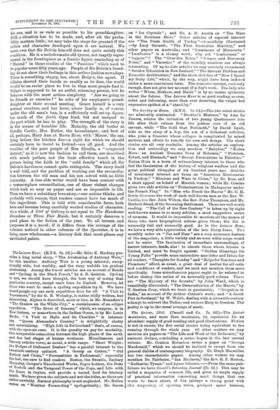The Sunday at Home. (R.T.S. 7s. Ed.)—The two serial stories
are admirably contrasted. " Heather's Mistress," by Amy Le Feuvre, relates the initiation of two young Quakeresses into life after their release from the jealous care of an old servant, while " The Gold that Perisheth," by David Lyall, tells us the story of a boy, the son of a dishonest solicitor, who joins a financier whose collapse is complicated by mixed motives and efforts to remedy his own evil doings. The short stories are all very readable. Among the articles on explora- tion and archmology we may mention "Babylon," " Kutna Hora : an Ancient Treasure Town of Bohemia," " Eisleben, Erfurt, and Eisenach," and " Recent Excavations in Palestine." Kutna Hera is a town of extraordinary interest to those who feel the fascination of the history of religious warfare and the great political struggles of six hundred years ago. Articles of missionary interest are those on "American Missionaries in Turkey," "Missions and Wars in China," by Dr. Ross, and a short appeal on behalf of Moorish women ; while Mr. Cousins gives two able articles on "Protestantism in Madagascar under the French Flag." In " Men who Reach the Masses " Mr. C. H. Irwin discusses the work of such well-known men as the Rev. W. Carlile, the Rev. John Wilson, the Rev. Peter Thompson, and Mr. Herbert Stead, of the Browning Settlement. These are well worth reading. " The Call of the New Century" is taken up by eight well-known names in as many articles, a most suggestive series of sermons. It would be impossible to mention all the names of those who have biographical notices given them ; the list is unusually full and unusually good. As in the Leisure Hour, we have a very able appreciation of the late Harry Jones. The monthly notes on " Far and Near" are a. very necessary feature of the magazine ; a little variety and an even wider scope would not be amiss. The fascination of immediate surroundings, of narrow interests, tends, alas ! to absorb those whose leisure is limited, and must be fought against "Golden Gleanings for Young Folks" provide some instructive anecdotes and fables for all readers. " Thoughts for Sunday" and "Helps for Teachers and Preachers" afford, as usual, a great deal of matter for all sorts and conditions of readers, and we need not mention them more specifically. Some miscellaneous papers ought to be referred to before closing this notice of an unusually good volume. These are " The Mystery of the Scarabs," by John Ward, which is beautifully illustrated; " The Demoralisation of the Maoris," by T. Gratton Gray, which we trust is pessimistic; " Irrigation in India," an account of Sir Arthur Cotton's work; and "A Jesuit Plot in Scotland," by W. Walsh, dealing with a sixteenth-century attempt to subvert the Tudors and restore Mary to freedom. The poetry is up to the usual average of merit.


























































 Previous page
Previous page